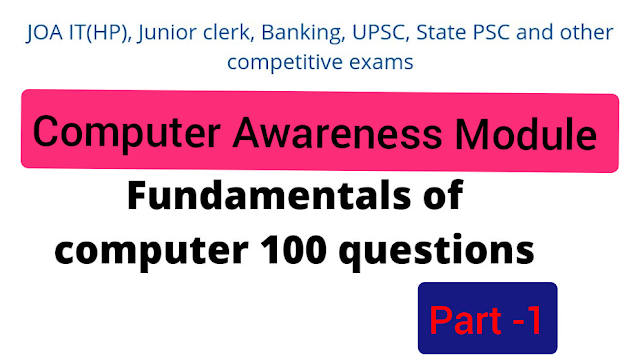Introduction to Computer
Meaning of Computer : The word computer has derived from an English word ‘Compute', which means 'to calculate'.
- A Computer is an electronic device which processes the input information according to the given set instruction called program.
- Blaise Pascal had developed the first mechanical calculator in 1642 AD, which is called Pascalene'.
- British scientist Charles Babbage was the first person to conceive an automatic calculator or a computer in 1833. He is called the 'Father of modern computer'.
- The credit of developing first computer program goes to Lady Ada Augusta, a student of Babbage. Howard Akin developed the first Mechanical Computer ‘Mark - i' in 1937.
- Herman Hollerith prepared an electronic tabulating machine in 1880, which was automatically functional with the help of Punch Card.
- J.P. Ekart and John Moschley invented world's first electronic computer 'ENIAC-I in 1946 and paved the way for first revolution in the field of calculating machine or computer. Electronic Valve or Vacuum Tube was used switch in the computer.
John Van Newman invented EDVAC (Electronic Descrete Variable Computer) in 1951, in which he used Stored Program. The credit of using Binary System in computers also goes to him. Indeed Mr. Newman contributed most in the development of computer and thus gave a right direction to the Computer Revolution (Second Revolution).
|
Five generations of Computer |
|||
|
Generation |
Period |
Electronic Components |
Main
Computers |
|
I |
1940-52 |
Electronic Valve Vacuum Tube |
EDSAC,
EDVAC, UNIVAC |
|
II |
1952-64 |
Transistor |
IBM-700, IBM-1401, IBM-1620, CDC
1604,
CDC-3600, ATLAS, ICL-1901 |
|
III |
1964-71 |
Integrated
Circuit |
IBM-700,
IBM-1401, IBM-1620, CDC |
|
IV |
1971- |
Largely Integrated Circuit |
Apple, DCM |
|
V |
------- |
Optical
fiber |
----- |
|
|
|
|
|
Types of Computer According to size and capacity these are following types of Computer
1. Micro Computer
These computers are used by individual, thus also called PC or Personal Computer. These days PCs are largely used for domestic and official purposes etc.
2. Mini Computer
This type of computer is comparatively larger than that of micro computer. This is 5 to 50 times more powerful than that of a Micro Computer
3. Main Frame Computer
These are large sized computers. By Time Sharing and Multi Tasking techniques many people rather more than 100 people can work at a time on different terminals of this computer.
4. Super Computer
These are very powerful computers and have more storage capacity. These are the most expensive and the fastest computers, able to process most complex jobs with a very high speed.
5. Quantum Computer
The development of this type is in final stage. Probably Quantum Computers will be more advanced than that of human brain. In Quantum Computers Q-Bit will be used in lieu of Binary Bits.
Programming Languages of different generations
|
|
|
|
Generation |
Languages |
|
1st
Generation (1940-52) |
FORTRAN-i |
|
2nd
Generation (1952-64) |
FORTRAN-ii, ALGOL-60, COBOL, LISP |
|
3rd
Generation (1964-71) |
PL / I, ALGOL - W, ALGOL - 68, Pascal, SIMULA- - 67, APL,
SNOBOL, 4 BASIC, C |
|
4th
Generation (1971--) |
CLUE, ALFARD, UCLID, Reformed Pascal,
MODULA, EDA, ORACLE |
|
5th
Generation (For future) |
Artificial |
Computer GK MCQs | Fundamentals of Computer | Part 1 | computer important questions | JOA IT
Tags
computer awareness
computer awareness pdf
Govt. Jobs
joa IT 817
joa it 939
junior office assistant
objective computer awareness
youtube videos



